| Article ID | Journal | Published Year | Pages | File Type |
|---|---|---|---|---|
| 6486648 | Biotechnology Advances | 2018 | 28 Pages |
Abstract
Decentralised or 'redistributed' manufacturing represents an attractive choice for production of some cell and gene therapies (CGTs), in particular personalised therapies. Decentralised manufacturing splits production into various locations or regions and in doing so, imposes organisational changes on the structure of a company. This confers a significant advantage by democratising supply, creating jobs without geographical restriction to the central hub and allowing a more flexible response to external pressures and demands. This comes with challenges that need to be addressed including, a reduction in oversight, decision making and control by central management which can be critical in maintaining quality in healthcare product manufacturing. The unwitting adoption of poor business strategies at an early stage in development has the potential to undermine the market success of otherwise promising products. To maximise the probability of realising the benefits that decentralised manufacturing of CGTs has to offer, it is important to examine alternative operational paradigms to learn from their successes and to avoid their failures. Whilst no other situation is quite the same as CGTs, some illustrative examples of established manufacturing paradigms are described. Each of these shares a unique attribute with CGTs which aids understanding of how decentralised manufacturing might be implemented for CGTs in a similar manner. In this paper we present a collection of paradigms that can be drawn on in formulating a roadmap to success for decentralised production of CGTs.
Related Topics
Physical Sciences and Engineering
Chemical Engineering
Bioengineering
Authors
Richard P. Harrison, Steven Ruck, Qasim A. Rafiq, Nicholas Medcalf,
